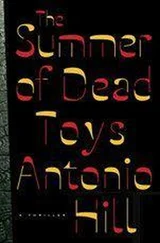Antonio Hill - The Good Suicides
Здесь есть возможность читать онлайн «Antonio Hill - The Good Suicides» весь текст электронной книги совершенно бесплатно (целиком полную версию без сокращений). В некоторых случаях можно слушать аудио, скачать через торрент в формате fb2 и присутствует краткое содержание. Жанр: Триллер, на английском языке. Описание произведения, (предисловие) а так же отзывы посетителей доступны на портале библиотеки ЛибКат.
- Название:The Good Suicides
- Автор:
- Жанр:
- Год:неизвестен
- ISBN:нет данных
- Рейтинг книги:5 / 5. Голосов: 1
-
Избранное:Добавить в избранное
- Отзывы:
-
Ваша оценка:
- 100
- 1
- 2
- 3
- 4
- 5
The Good Suicides: краткое содержание, описание и аннотация
Предлагаем к чтению аннотацию, описание, краткое содержание или предисловие (зависит от того, что написал сам автор книги «The Good Suicides»). Если вы не нашли необходимую информацию о книге — напишите в комментариях, мы постараемся отыскать её.
The Good Suicides — читать онлайн бесплатно полную книгу (весь текст) целиком
Ниже представлен текст книги, разбитый по страницам. Система сохранения места последней прочитанной страницы, позволяет с удобством читать онлайн бесплатно книгу «The Good Suicides», без необходимости каждый раз заново искать на чём Вы остановились. Поставьте закладку, и сможете в любой момент перейти на страницу, на которой закончили чтение.
Интервал:
Закладка:
The woman didn’t respond straightaway.
“Well, there were a few men, although I don’t think they were very used to digging. They must have been gone all afternoon.”
Héctor nodded.
“Where did they bury them?”
Dolors went back to the window.
“See: the road you came by continues up to link with the highway. The alzina surera … How do you say that in Spanish?”
“Cork tree,” said Héctor.
“So this, the cork tree where those poor beasts were hanged, is about two kilometers away, beside an old shed. Of course, in the morning they’d gone on foot; it was part of these games they do.” The woman said it in the same tone she’d have spoken of a sandcastle at the beach. “In the evening they went in the van. The one you see in the photo.”
It was a large van, almost a minibus, with room for eight people. If they’d decided burying the dogs was the responsibility of the whole group, the most logical thing would be that they all go together, despite neither Amanda Bonet, nor Sílvia, nor Manel having a tool in their hands. Dolors Vinyals seemed to read his mind, because she added, “They all worked together. The women too. Although they were the most tired: they were still complaining the following day. They were pulling faces.”
They must have felt proud, thought Héctor: at the end of the day they’d spent their free afternoon doing something unpleasant just because they thought it right. Surely they’d returned tired but happy.
Lola had said little, but suddenly she turned to Señora Vinyals.
“Dolors-may I call you Dolors? I just realized that we have the same name.”
“Of course, dear. Lola, Dolors, Lolita-it’s not a name people have these days. There’s no twenty-year-old girls named so, at least around here.”
“It’s true,” agreed Lola, smiling. “Less and less. Before, when you said they were strange, were you just referring to them complaining more than others?”
“Oh no. Not only that. That had gone out of my head. It was because of the bikes.”
“Bicycles?” asked Lola.
Héctor let them talk without interrupting.
“The boys, our sons, woke us on Sunday morning saying the bikes had been stolen. Such a row … They were good bikes, and expensive too. They cost us a fortune and they were new. Joan and I thought we would have to buy them new ones, but when I came to say good-bye to the group, the bikes were here.”
“They’d taken them? Without permission?” Lola’s voice sounded surprised.
“Not exactly without permission. When they arrived we showed them where we lived, in case they needed anything, and told them that if they wanted to use them to go for a ride they were welcome to. Some do, but they tell us they’re taking them, of course.”
“Did they explain at all?”
“A young dark-haired man, very good-looking, told me that he and another guy had decided to go for a ride first thing Sunday morning and they didn’t want to wake us. He apologized, poor boy, and at the end of the day it didn’t really matter, although I couldn’t help telling him he’d given the boys a good fright. They could have at least left a note. But I tell you, give them an inch and they’ll take a mile. That’s how it goes, isn’t it?”
“Were the bikes in good condition?” inquired Héctor, who didn’t want the conversation to lapse into clichés and sayings.
“As always. It’s not as if my boys polish them after using them, believe me.”
She had little more to add. Héctor and Lola looked over the house in five minutes and, after thanking Señora Vinyals, they went to get the car. Before leaving, Héctor wanted to see the cork tree. Even without dogs. And more than anything he wanted to straighten out his thoughts and find a logical solution to the whole business.
34
For the first time in his life, César was happy to barge into Sílvia’s apartment in her absence. It wasn’t the day he usually came, but he’d come back very tired from seeing Octavi the night before and went straight to his own house. He needed to think, analyze everything.
César entered and shut the door firmly. Without knowing, he sensed Emma was there, so he headed for her bedroom with a concrete aim. He hadn’t seen her since the previous Sunday, that uncomfortable day, plagued by silences and the memory of what had happened in the early hours. César hadn’t completely lied when he told Brais he preferred to spit out remorse rather than let it take root within him, like a weed; however, he was aware that the situation had become very delicate. He wasn’t especially skillful at dealing with people, but he had to find a way of ensuring Emma’s silence.
The girl’s bedroom door was open. Sitting in front of the computer, Emma seemed absorbed in what she had up on screen-maybe a chat with some friend. He knocked on the door, suddenly nervous. She saw him reflected on the screen and turned, slowly, with a slightly annoyed expression on her face.
“Here already? It’s not Tuesday …”
César didn’t really know what that meant; the teenager’s tone rattled him. It was as if nothing had happened.
“Emma, can we talk?”
She smiled inwardly, closed the chat window and turned her chair around, legs slightly apart.
“Of course. Whatever you say.” She smiled. “After all, you’ll be like a father in a few months.”
César detested this perverse child manner. He’d come planning to treat her like a woman and found this shameless version of Lolita.
“Emma, stop playing around. This is serious.”
“Whoa, what have I done now?”
She brought her legs together and crossed her arms. “Okay, tell me-I’m busy, you know? And you should be at work at this time. Mama is going to put you on a warning if you keep leaving the warehouse so early.”
César was unable to work out if she chose her words deliberately to humiliate him, or if they simply occurred to her spontaneously. In any case, she managed to offend him, above all with the stress she’d put on words like “warning” and “warehouse.” At the same time he realized she was provoking him, challenging him to a game he didn’t want to play. Not anymore. Not that day or ever.
“I won’t bother you for long. I don’t want you to say it’s my fault you haven’t finished your homework.”
His attempt at being ironic clashed with the evident truth that she, at sixteen, was still at the age of having homework. Emma, however, was generous enough to make no comment, although her expression beat any contemptuous reply she could give him.
“I want to talk about what you said the other day. About Sara Mahler.”
César had the satisfaction, indeed, of seeing her confused. He didn’t only want to speak of that, of course, although since the day before, since the conversation with Brais in the car, something he’d said had been going around in his mind: “At least you can talk about it with Sílvia.”
Emma rose from the chair, as if she were bored of the subject, and turned to the door.
“Do you really want to talk about this Sara?” she asked, smiling, as she made as if to caress his cheek.
“Yes.” And in a move he instantly regretted, he grabbed her wrist. Not hurting her, just so the caress remained in the air. “Emma, you have to tell me what the hell you heard. Don’t lie to me. It’s very important.”
“Let go.”
He paid no attention. On the contrary, he pressed a little harder.
“Answer me, Emma!”
“ ‘Answer, Emma.’ ‘Shut up, Emma.’ You’re the same as Mama. Why not ‘ Sit , Emma’? Do you think I’m your pet?”
César then grabbed her by both arms and pushed her against the wall.
“Fuck, answer!”
Читать дальшеИнтервал:
Закладка:
Похожие книги на «The Good Suicides»
Представляем Вашему вниманию похожие книги на «The Good Suicides» списком для выбора. Мы отобрали схожую по названию и смыслу литературу в надежде предоставить читателям больше вариантов отыскать новые, интересные, ещё непрочитанные произведения.
Обсуждение, отзывы о книге «The Good Suicides» и просто собственные мнения читателей. Оставьте ваши комментарии, напишите, что Вы думаете о произведении, его смысле или главных героях. Укажите что конкретно понравилось, а что нет, и почему Вы так считаете.












